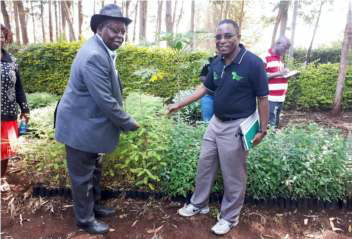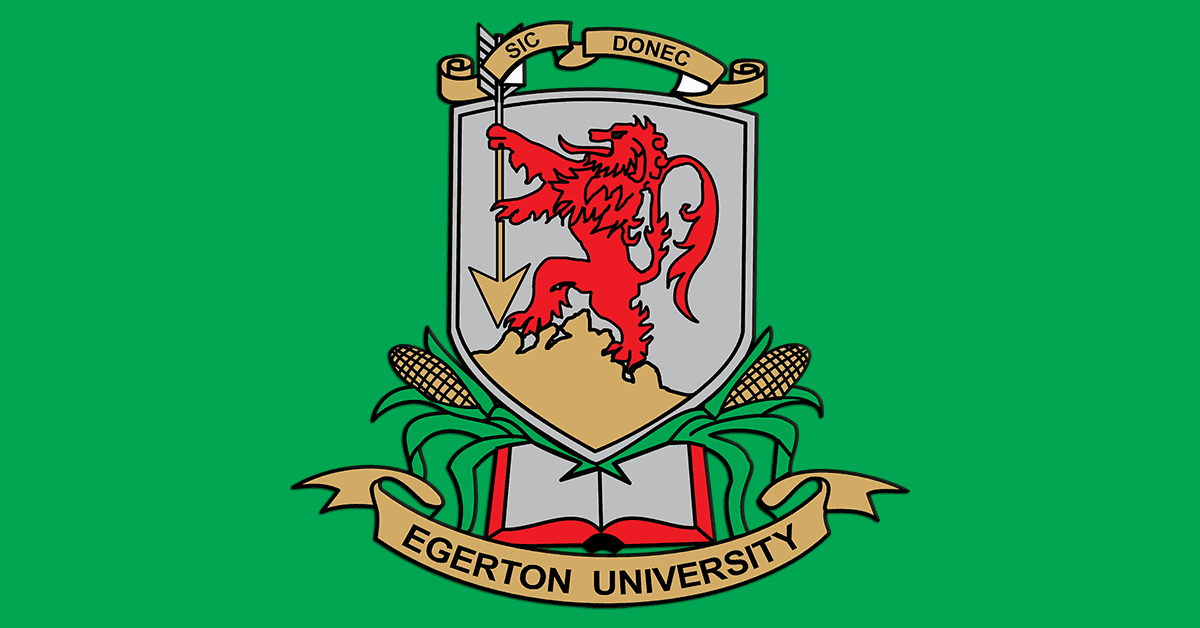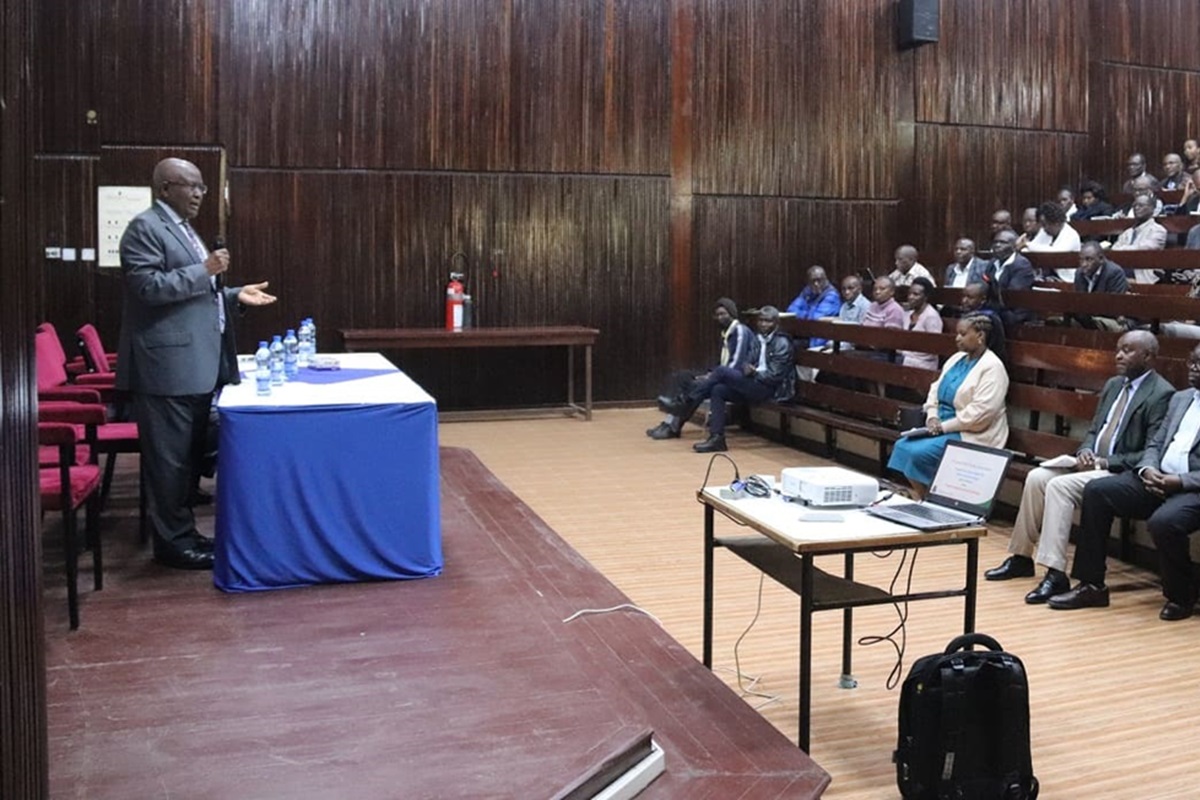My Journey from the Lecture Hall to Biovision
 Dr. David Mulama Amudavi (right) with Biovision Farmer CommunicationDr. David Mulama Amudavi (right) with Biovision Farmer CommunicationProgramme Advisory Board Chair, Mr. John Njoroge of the Kenya Institute of OrganicFarming visit one of the Biovision outreach projects in Kirinyaga County, on 14December 2017. (Photo courtesy of Dr. Amudavi)I would like you to bring that capI would like you to bring that caphome”, my father whispered to me as heguided me to a spot from which I couldbest follow the graduation ceremony atthe University of Nairobi in 1984. I wasone of my dad's ten children, and, withthe foresight he possessed regarding thepower of education, he wanted all of us todo well in school. Soon, I became thesubject of his particular encouragementas he had discerned an academic interestand thirst for knowledge in me. Today Iam what I am because of his vision forme. My father's words sank deep into my consciousness. The more I thought about consciousness. The more I thought aboutthem the more I was convinced thatnothing could stop me from making thema reality. Sadly, my father did not livelong enough to experience the pride ofmy having acquired three “caps” – fromKenya, Australia, and North America.
Dr. David Mulama Amudavi (right) with Biovision Farmer CommunicationDr. David Mulama Amudavi (right) with Biovision Farmer CommunicationProgramme Advisory Board Chair, Mr. John Njoroge of the Kenya Institute of OrganicFarming visit one of the Biovision outreach projects in Kirinyaga County, on 14December 2017. (Photo courtesy of Dr. Amudavi)I would like you to bring that capI would like you to bring that caphome”, my father whispered to me as heguided me to a spot from which I couldbest follow the graduation ceremony atthe University of Nairobi in 1984. I wasone of my dad's ten children, and, withthe foresight he possessed regarding thepower of education, he wanted all of us todo well in school. Soon, I became thesubject of his particular encouragementas he had discerned an academic interestand thirst for knowledge in me. Today Iam what I am because of his vision forme. My father's words sank deep into my consciousness. The more I thought about consciousness. The more I thought aboutthem the more I was convinced thatnothing could stop me from making thema reality. Sadly, my father did not livelong enough to experience the pride ofmy having acquired three “caps” – fromKenya, Australia, and North America.That momentous graduation tookplace just before I joined Alliance HighSchool for my A-level following a sterling performance as the best O-levelsterling performance as the best O-levelcandidate at Kakamega High School.Those days Kakamega High wasrenowned for its great football team, theGreen Commandos, who still play today.I marvelled at the wonders theyperformed on the field, but mostlyfocused on my academic assignments.
The day my dad took me to Alliance isetched in my memory. This was theschool I had longed to join ever since Ihad scored 3 A's in the Kenya Certificateof Primary Education Examinations – theschool that would make me “strong to serve”.serve”.
I completed my studies at Allianceand gladly accepted my second choicefor my higher education (the first hadbeen medicine) – that of Bachelor ofScience in Agricultural Education andExtension at Egerton University. Thisturned out to be a great bi-professionalprogramme in agriculture and educationthat saw me benefit from the great coaching, mentorship and guidance bycoaching, mentorship and guidance byEgerton dons, including the late Prof.Wycliffe Ong'ondo, Prof. Joash Kibett,Prof. Nephat Kathuri, and Prof.Christopher Onyango. When time camefor teaching practice, I went to Moi HighSchool, Kabarak, together with mycolleague, the late Dr. Mary ChepkiteLopokoiyit. As for my field attachment, itwas in Nyandarua County, where Ishared a room with two other students,one of whom is now a high schoolprincipal and the other a senioragricultural economist in the Ministry ofAgriculture.
Going through various courses ofmy programme, referred to as AGED,shaped my professional future. We wouldbe up at 4am, dressed in aprons andgumboots, to start Livestock Procedures,which we called Livestock Duties.Dealing with poultry, sheep, goats, andmilking dairy cows manually and withthe use of machines made me appreciatethe value of hands-on experience. I wasthrilled to learn to drive and operate afarm tractor under the direction of Prof.Godfrey Ngunjiri and his team inAgricultural Engineering. Prof. LouisMumera taught us to keep time. If youcame to his class late, he would stopteaching until you, the unpardonablewrongdoer, left the room. This instilled inme a great sense of discipline.
Life on campus was exciting andgenerally free of trouble. The HigherEducation Loans Board allowance wewere given, the famous “boom”, wassufficient to meet all our basic needs. Thefood was excellent. We used to have awonderful breakfast with quality tea,bread, sausages, and fruits. A sense ofcommunity developed among us as weshared our delicious meals.
O n c o m p l e t i o n o f m yundergraduate studies, I had the option ofteaching Agriculture and Biology in ahigh school or joining agricultural e x t e n s i o n w i t h t h e M i n i s t r y o fe x t e n s i o n w i t h t h e M i n i s t r y o fAgriculture or a related institution. Ichose teaching, and in June 1990 theTeachers Service Commission (TSC)posted me to Lumakanda Girls inWestern Kenya. However, as graduationapproached, I was both surprised andproud to be offered the position ofTeaching Assistant in my Department ofAgricultural Education and Extension.This was on account of the first classhonours degree I had obtained and thestrong grade in the dreaded Grade PointAggregate (GPA) system. By 1 October1990 I was back at Egerton as a “TA”.Transiting from a student to a universityacademic staff member so quicklyinspired me beyond measure, and I couldsee myself becoming a professor oneday! I was now “material” for staffdevelopment. I did not disappoint.
Within one year, I was awarded ascholarship from Australia's Equity andMerit Scholarship Scheme (EMSS). Ijoined Melbourne University for aM a s t e r ' s p r o g r a m m e , w h i c h Isuccessfully completed. In addition, itwas while at Melbourne that I met theyoung woman who would become mywife.
In 1994, I returned to Egerton andcontinued teaching my favourite subjects– Agricultural Extension, RuralSociology, Technical Report Writing,and Communication Skills.
Within three years, I became alecturer.
Teaching with a Master's degree at theUniversity was not good enough for me,nor did the University encourage it. I hadalways wanted to study either in theUnited States or Europe for myd o c t o r a t e . M y s t r o n g a c a d e m i cbackground, established by EgertonUniversity and buttressed by MelbourneUniversity, saw me land a RockefellerFoundation Scholarship in 2001 topursue a doctorate in Adult andExtension Education with minors inDevelopmental Sociology and NaturalResource Management (NRM) atCornell University, USA. I obtained myPh.D. degree and returned to Egerton University in 2005.University in 2005.
Soon after, in July 2006, I undertook atwo-year postdoctoral fellowship withthe International Centre of InsectPhysiology and Ecology (ICIPE), undertheir project “Creating Smallholder-LedG r o w t h t h r o u g h ' P u s h - P u l l 'Technologies in Eastern Africa”. As partof my work on this project, I supervisedtwo Ph.D. and five Master's students.
The postdoctoral opportunitytriggered a life-changing turn in mycareer. I was suddenly faced with adilemma: Should I continue teaching orshould I join ICIPE as a senior scientist?If I settled for ICIPE, I would coordinatea Farmer Communication Programme(FCP) and start a new organisationaround it. After considerable thought, Ileft teaching. I have not regretted mydecision.
In 2011, I started the BiovisionAfrica Trust (BvAT) based at ICIPE, inKasarani, Nairobi. As the ExecutiveDirector I oversee the running of all itsprogrammes in Kenya and Africa. Theorganisation runs an FCP, to promotefood security, economic growth, andenvironmental stability. It disseminatesinformation and knowledge to farmersthrough multiple channels, whichinclude Infonet-Biovision (a web-basedknowledge platform); The OrganicFarmer Magazine; The Organic FarmerRadio (TOF Radio), which airsagricultural news on KBC and somevernacular stations; Mkulima Mbunifu, afarmers' magazine for Tanzania; andoutreach programmes with farmerresource centres in 13 counties in Kenya.We put effort into facilitating the sharingof information, knowledge, andexperiences from farmer-to-farmer, andexperts-to-farmers and vice-versa.
T h r o u g h m y o rg a n i s at i o n Icoordinate the African Union-supportedEcological Organic Agriculture (EOA)Initiative implemented in nine countriesin Africa (i.e. Benin, Kenya, Ethiopia,Mali, Nigeria, Senegal, Rwanda,Tanzania, and Uganda). The overall goalof the initiative is to mainstream EOAinto national agricultural production systems by 2025 to improve agriculturalsystems by 2025 to improve agriculturalproductivity, food security, access tomarkets, and sustainable development inAfrica. I also oversee the Secretariat ofthe Continental Steering Committeeproviding oversight to the continentalinitiative on behalf of the African UnionC o m m i s s i o n . I c o o r d i n a t e t h eK n o w l e d g e C e n t r e o n O r g a n i cAgriculture in Africa for the EasternAfrica region currently covering Kenya,Uganda, Tanzania, and Rwanda. Thegoal of the project is to ensure knowledgehubs are successfully introduced as aninnovative strategy for promotingorganic agriculture in West, East, andSouthern Africa.
I have alliances in promotinggenuine sustainable agriculture that gobeyond Africa. In this regard I waselected member of the World Board ofthe International Federation of OrganicAgriculture Movements (IFOAM) –International Organics. The 10-memberteam is charged with overseeing andsupporting IFOAM's work in growingthe global organic marketplace,communicating the benefits of organicagriculture, training organic leaders, andfacilitating capacity-building for organicfarmers.
Though currently working at theinterface of research, practice, andpolicy, I continue to connect withacademia through supervision ofgraduate students and undertaking of therole of an external examiner for Ph.D.and Master's theses from variousuniversities in East Africa.
I will forever be indebted to EgertonU n i v e r s i t y f o r m y v e r s a t i l i t y,disposition, strength, and resilience toserve in many capacities while workingwith farmers, researchers, practitioners,a c a d e m i c s , p o l i c y m a k e r s , a n ddevelopment partners not only in Kenyabut also across our great continent andthe globe.Long live Egerton University!







